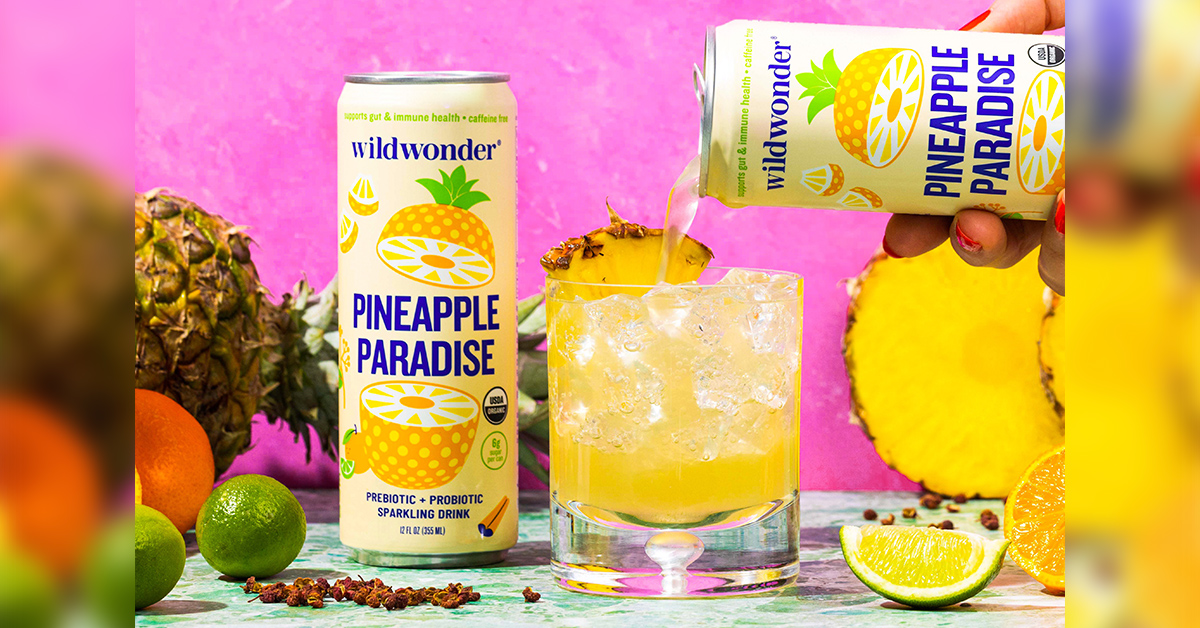After two years of working to expand distribution beyond its home market in San Francisco, functional beverage brand Wildwonder may have begun to hit its stride, launching a new flavor – Pineapple Paradise – on a 3-month exclusive with Sprouts. The AAPI-owned, tropical-inspired prebiotic and probiotic sparkling beverage made its first move beyond its region-focused distribution strategy when it launched nationwide at Sprouts last October.
“The whole idea [with the new flavor] is – it’s like summer and tropical,” said founder and CEO Rosa Li. “[We thought] – what nostalgic flavors can we bring back with a twist of something modern and put our own [spin] on pineapple?”
Wildwonder’s full lineup now consists of 7 SKUs including flavors like Mango Gold (formerly Mango Turmeric), Guava Rose and Strawberry Passion. After rebranding from Tea Crush to its current moniker in 2020, a year later the company raised $2.1 million to fund an expansion beyond the West Coast. Under Tea Crush, the company once sold a Pineapple Matcha flavor, but Li said this new iteration is a totally different take on pineapple.
The brand’s recipes aim to honor its AAPI-heritage with every ingredient – including its sweetener of choice, monk fruit, which is native to Southeast Asia. Li said that after a report was released last year linking sugar alcohol erythritol to cardiovascular issues numerous consumers contacted the brand to ensure it didn’t have “any elements of erythritol.” Forgoing natural sweetener stevia has also proven to be an added benefit in the eyes, and taste preferences of customers, Li claims.
The use of monk fruit has generated a “very different flavor profile” than a traditional soda, she said. While each beverage features added fiber and prebiotic cultures, Wildwonder isn’t trying to be like kombucha nor better-for-you prebiotic sodas like Olipop, Culture Pop and Poppi. As the kombucha boom has gone flat, Li said retail shelf space that once went to those glass bottles of vinegar-y concoctions now hold a broader swath of functional brews and Wildwonder’s AAPI-heritage-inspired, gut health-forward brew has been able to capitalize on the space that exists between the two categories.
“People are looking for something convenient that’s more accessible,” said Li. “Our whole thesis is we’re here to expand the market for kombucha with no fermented tastes, so [the idea is to] make these heritage-inspired gut healthy ingredients more accessible to the average consumer.”
Since the onset of the pandemic Li has worked to diversify the business, including its distribution strategy. She said in the past the brand was focused on growing region-by-region, and going “deep not wide,” but when Sprouts came knocking last year, the potential opportunity to drive brand awareness was too large to pass up.
“Right off the bat, we were top five in velocity in our category and the buyer was very happy with our performance,” Li said. “We out-performed most of the kombuchas on shelf and.. then Sprouts expanded us by launching two new flavors.”
Looking ahead, this year the brand is focusing on expansion in mass and conventional retail and recently launched in Southern California Target stores. Over the past two years, Wildwonder has grown its retail footprint from its home market in Northern California, to 1,200 doors across 40 states nationwide. By the end of 2023, Li estimates the brand will be on shelf at 3,000 retailers.
Li believes that efforts to educate consumers on the benefits of prebiotics from brands like Poppi and Olipop has benefited the entire industry, she sees Wildwonder as a challenger to those brands, rather than an alternative. Amid rising awareness around gut health, she has seen many other brands adding prebiotics and fiber to “every drink they can possibly think of” and believes Wildwonder’s thoughtful approach to R&D sets them apart from the rest of the pack.
“It’s just like when everyone added CBD to every drink,” Li said. “We approach formulation and branding in a very thoughtful way – we don’t want to just add functional ingredients [to add them]. These are very well thought out. The original thesis isn’t ‘let’s add some fiber to a ready-to-drink beverage,’ it is really here to expand the market for kombucha.”
Those thoughtfully selected organic ingredients, and the products’ not-soda-like positioning, are also the reason for its slightly higher price point – a can of Wildwonder goes for $3.49 versus the average BFY soda that rings in around $2.50 to $3.00. Inflation has made sourcing the brand’s heritage-inspired organic ingredients increasingly more complex and expensive, Li said, explaining that diversification has once again proven to be key.
“If there’s anything I learned from COVID it really is – diversification,” Li stated. “We [now] diversify our supply vendors, we diversify our co-packing partners, we diversify our channel strategy – diversification is really the name of the game. We have multiple partners for every single ingredient we source in case something happens with one of them and that’s also really helped us as we scale.”
Li said Wildwonder has quadrupled its production capacity over the past four months in order to keep up with demand this coming summer. The brand has sold over 3 million cans since its launch in 2020 and has achieved explosive (500% growth) over the course of the past year. Despite the brand’s global-inspired flavor profile and current growth trajectory, Li is not yet thinking about international expansion and is “very much focused on the U.S.”
“[Our goal] is definitely national expansion,” Li stated. “We want to dominate the national market, but also mass retailers… We’re growing with most of the retailers that we currently partner with and this is the year where we are testing out mass retailers and conventional retailers. It’s really exciting to see our thesis proving out and making Wildwonder more accessible.”
